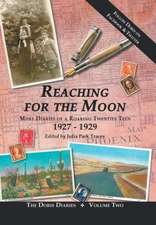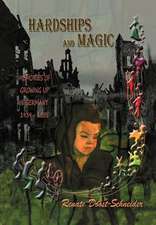George Meléndez Wright: The Fight for Wildlife and Wilderness in the National Parks
Autor Jerry Emoryen Limba Engleză Hardback – 26 apr 2023
When twenty-three-year-old George Meléndez Wright arrived in Yosemite National Park in 1927 to work as a ranger naturalist—the first Hispanic person to occupy any professional position in the National Park Service (NPS)—he had already visited every national park in the western United States, including McKinley (now Denali) in Alaska. Two years later, he would organize the first science-based wildlife survey of the western parks, forever changing how the NPS would manage wildlife and natural resources. At a time when national parks routinely fed bears garbage as part of “shows” and killed “bad” predators like wolves, mountain lions, and coyotes, Wright’s new ideas for conservation set the stage for the modern scientific management of parks and other public lands.
Tragically, Wright died in a 1936 car accident while working to establish parks and wildlife refuges on the US-Mexico border. To this day, he remains a celebrated figure among conservationists, wildlife experts, and park managers. In this book, Jerry Emory, a conservationist and writer connected to Wright’s family, draws on hundreds of letters, field notes, archival research, interviews, and more to offer both a biography of Wright and a historical account of a crucial period in the evolution of US parks and the wilderness movement. With a foreword by former NPS director Jonathan B. Jarvis, George Meléndez Wright is a celebration of Wright’s unique upbringing, dynamism, and enduring vision that places him at last in the pantheon of the great American conservationists.
Preț: 180.77 lei
Nou
Puncte Express: 271
Preț estimativ în valută:
34.59€ • 35.91$ • 28.85£
34.59€ • 35.91$ • 28.85£
Carte disponibilă
Livrare economică 04-18 martie
Livrare express 15-21 februarie pentru 34.28 lei
Preluare comenzi: 021 569.72.76
Specificații
ISBN-13: 9780226824949
ISBN-10: 0226824942
Pagini: 248
Ilustrații: 26 halftones
Dimensiuni: 152 x 229 x 25 mm
Greutate: 0.59 kg
Ediția:First Edition
Editura: University of Chicago Press
Colecția University of Chicago Press
ISBN-10: 0226824942
Pagini: 248
Ilustrații: 26 halftones
Dimensiuni: 152 x 229 x 25 mm
Greutate: 0.59 kg
Ediția:First Edition
Editura: University of Chicago Press
Colecția University of Chicago Press
Notă biografică
With four decades of conservation experience, Jerry Emory has written dozens of articles on the environment and science with a focus on Latin America and the Western United States. He is the author of five books, including San Francisco Bay Shoreline Guide and Monterey Bay Shoreline Guide. Emory lives with his family in Mill Valley, California.
Cuprins
Foreword
Preface: Field Notes and Family
Prologue: Serendipity
Chapter 1. The Magic Window
Chapter 2. University of California, Berkeley
Chapter 3. Summers: Alaska and the West
Chapter 4. Yosemite: Dream Achieved, 1927–29
Chapter 5. Am I Visionary, or Just Crazy?
Chapter 6. Beginnings: The Wildlife Survey, 1930
Chapter 7. The Intangible Beauty of Nature, 1931–33
Chapter 8. New Deal, Old Problems
Chapter 9. Outstanding Men
Chapter 10. It Looks Like a Resurrection
Chapter 11. Chapo
Chapter 12. Legacy
Epilogue: On a Good Day
Acknowledgments
Notes
Index
Preface: Field Notes and Family
Prologue: Serendipity
Chapter 1. The Magic Window
Chapter 2. University of California, Berkeley
Chapter 3. Summers: Alaska and the West
Chapter 4. Yosemite: Dream Achieved, 1927–29
Chapter 5. Am I Visionary, or Just Crazy?
Chapter 6. Beginnings: The Wildlife Survey, 1930
Chapter 7. The Intangible Beauty of Nature, 1931–33
Chapter 8. New Deal, Old Problems
Chapter 9. Outstanding Men
Chapter 10. It Looks Like a Resurrection
Chapter 11. Chapo
Chapter 12. Legacy
Epilogue: On a Good Day
Acknowledgments
Notes
Index
Recenzii
"In George Meléndez Wright: The Fight for Wildlife and Wilderness in the National Parks, Emory grants Wright the well-deserved credit he is due. Part biography, part historical account, the book reads like a love letter to Wright."
"Emory’s enumeration of Wright’s accomplishments—including a survey of wildlife in Western parks, the first of its kind—is nothing short of awe-inspiring. Emory, who is married to one of Wright’s granddaughters, has succeeded admirably in demonstrating the continuing relevance of Wright’s ideas and the value of his legacy. Highly recommended for nature lovers and park enthusiasts."
"Although Wright died in a car accident at age thirty-one, his fervor for our national parks and substantial achievements in furthering conservation biology left a lasting legacy and are a testament to how full and influential a short life can be."
"Emory has in this book brought the remarkable story of George Meléndez Wright out of the shadows of national park history. It is a story of brilliance, vision, tragedy, and missed opportunity. . . . This book is an informative, thoroughly researched, and readable account of a remarkable man of historic importance."
"Almost a century after his death, a dedicated young biologist remains a role model for conservationists."
"One of the most influential people ever to work for the National Park Service. . . . Wright was [also] the first Hispanic employee to hold a professional position with the Park Service, and Emory’s book details his background, training and impact, providing the reader with insights into the life of one of least known heroes in the era of modern conservation."
"The National Park Service has many unsung heroes, and George Meléndez Wright is in the top tier. In this book, conservation writer Emory documents how Wright was responsible for the first wildlife policy handbook developed for the NPS. . . . Emory's text is illustrated with black-and-white photos; interspersed throughout are short quotes primarily from Wright’s work but also from friends and others involved in the reformulation of wildlife policy. Anyone interested in the history and evolution of the national parks and the National Park Service will find this book a good read. Highly recommended."
"Emory's account is a captivating tale of individual passion that fills an important gap in the historical literature on conservation."
"Emory is to be commended for writing this biography and helping to bring Wright’s life and work to light. Both a general audience and specialists interested in conservation and its history, like environmental historians, will find lots to take away from this book."
“To those of us who have worked in conservation, and especially in the National Park Service, as I did for forty years, George Meléndez Wright is a hero, icon, and role model. His story deserves to be told, and Emory has done that well. It will inspire readers to lives in service to conservation of the planet upon which we all depend.”
“George Meléndez Wright was a pivotal figure––pushing the vision of parks from scenic tourist spots to crucial sites for the preservation of the natural world. This remarkable, vibrant history fills a large gap in our understanding of––and appreciation for––a person who left a lasting legacy.”
“George Meléndez Wright cuts a remarkable figure in the history of American conservation: keen and patient observer of nature, acute scientist, skillful navigator of politics, passionate advocate for national parks, bilingual emissary to Spanish-speaking colleagues, poetic writer, and, above all, ecological visionary ahead of his time. He was also a generous and well-loved friend to many, which is why his accidental death at a young age was felt so acutely. Emory’s telling of Wright’s story superbly captures the full-to-the-brim life of this underappreciated pioneer of nature protection. Capitalizing on exclusive access to a trove of personal field journals and other papers, as well as archival research, Emory’s own prose sings with the spirit of George Meléndez Wright and leaves us inspired to carry on his work in our own time.”
























